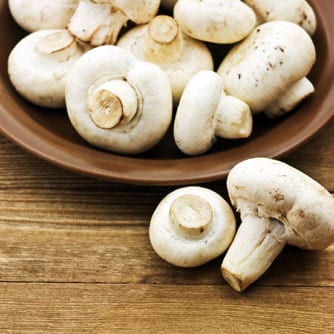Low in calories, fat-free, cholesterol-free and very low in sodium, mushrooms provide many of the nutritional attributes of produce, as well as attributes more commonly found in meat, beans or grains. Recently published studies suggest important potential health benefits associated with mushroom consumption:
- Promotes healthy weight: Lawrence Cheskin, from the Johns Hopkins Bloomberg School of Public Health (Maryland, USA), and colleagues enrolled 73 obese adults, mean age 48.4 years, who were placed in an intervention group eating approximately one cup of mushrooms per day in place of meat, and a standard diet control group. At the end of the one-year trial, researchers found that participants who substituted mushrooms for meat lost seven pounds, showed improvements in body composition compared to participants on the standard diet, and maintained the weight loss. Specifically, those in the intervention group reported lower calorie and fat intake (123 calories, 4.25 grams respectively, per day); lost more pounds and percentage body weight (7 pounds, 3.6% of their starting weight); achieved lower body mass index (1.5kg/m2), waist circumference (2.6 inches) and percent total body fat (0.85%), as compared to participants on the control diet. The study authors conclude that: “encouraging adults to substitute edible mushrooms for red meat in three meals/week was found to be a useful strategy for enhancing weight loss and maintenance efforts among overweight/obese adults.”
- Boosts immune function: Xiaoshuang Dai, from University of Florida (Florida, USA), and colleagues enrolled 51 healthy adults, who were randomly allocated to consume either 50g/d or 100g/d of dried, whole Shiitake mushrooms for 28 days. Data revealed that one or two servings of dried shiitake mushrooms “is immuno-modulatory, as seen by the altered pattern of cytokine secretion.”
- Raises Vitamin D levels: Michael F Holick, from Boston University Medical Center (Massachusetts, USA), and colleagues show that eating dried white button mushroom extract containing Vitamin D2 can be as effective at increasing and maintaining Vitamin D levels as taking supplemental D2 or D3. The study authors report that: “These results demonstrate that in addition to vitamin D2, mushrooms can also produce vitamin D3 and vitamin D4.”




